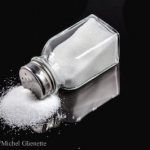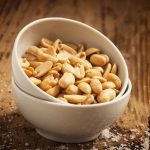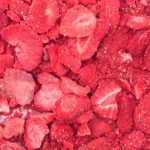The Morbidity and Mortality Weekly Report has a paper on trends in the prevalence of excess dietary sodium intake in the U.S. from 2003 to 2010. Excess sodium intake is a problem in this country. Eating too much sodium can lead to hypertension, the primary risk factor for cardiovascular disease. Reducing population sodium intake is a national priority. CDC analyzed data from the national Health and Nutrition Examination Survey (NHANES) of 34,916 participants. Tolerable upper intake levels are 2,300 mg per day for anyone over the age of 14. They found that the majority of the U.S. population over the age of 1 year consumes too much sodium. The prevalence of excess usual sodium intake ranged from 79.1% for children aged 1-3 years to 95.4% for U.S. adults aged 19-50 years. A small … [Read more...]
Americans’ Eating Habits Got Worse in 2013
According to a Gallup and Heathways poll, Americans' eating habits got worse in 2013, with produce consumption declining in most months, compared to polls in 2012. Fewer adults are reporting eating healthy "all day yesterday" in every month this year compared to the same months last year. The percentage of U.S. adults who ate "healthy" declined from about 67% in 2012 to 63 to 65% in 2012. At least 500 Americans take place in this poll each month. Health eating usually follows a seasonal pattern. People start out in January eating more healthy foods, but that number gradually declines into the spring months. Produce consumption increases slightly in the summer months, then declines to a low in December, most likely because of holiday indulgence. Fewer Americans eat at least five … [Read more...]
Study Finds Low Vitamin D Levels Lead to Cognitive Decline
A study published in Free Radical Biology and Medicine conducted at the Sanders Brown Center on Aging at the University of Kentucky found that low vitamin D levels in middle aged and older people may promote cognitive decline. Scientists changed vitamin D levels in rats and looked at changes in vitamin D-dependent proteins in the brain. They found that middle-aged rats fed a diet low in Vitamin D developed free radical damage to the brain. In addition, there was a "significant decrease" in tests on learning and memory. Vitamin D deficiency is very common among elderly Americans. Researchers think that vitamin D supplementation may help protect against cognitive decline in adults. This is the first study to show that a diet that is chronically low in Vitamin D alerts glucose … [Read more...]
New Study Finds Asparagine Essential for Brain Development
A new study from scientists at the University of Montreal has found that asparagine, an amino acid that has been considered non-essential because the body produces it naturally, may be an essential amino acid required in our diets. Senior co-author of the study, Dr. Jacques Michaud, said, "the cells of the body can do without it because they use asparagine provided through diet. Asparagine, however, is not well transported to the brain via the blood-brain barrier." Asparagine is found in meats, eggs, and dairy products. The scientists looked at people who carry a mutation that causes a rare disease called congenital microcephaly. They found that a specific genetic variant caused a deficiency of the enzyme that synthesizes the amino acid. If the brain doesn't get enough asparagine, cells … [Read more...]
Eating Nuts Reduces Risk of Major Diseases
A study published earlier this month in the New England Journal of Medicine states that increased nut consumption is associated with a reduced risk of major chronic diseases, including type 2 diabetes and cardiovascular disease. The study also found that people who ate nuts every day weighted less. The nut consumption with total and cause-specific mortality was looked at in the Nurses' Health Study and in the Health Professionals Follow-up Study. Researchers found that eating a handful of nuts was inversely associated with total mortality in men and women. The results were independent of other predictors for mortality. The nuts included peanuts, almonds, Brazil nuts, cashews, hazelnuts, macadamias, pecans, pine nuts, pistachios, and walnuts. The amount was 3 tablespoons, eating seven … [Read more...]
Frozen Produce May Retain Vitamins Better than Fresh Stored
The University of Georgia, along with the Frozen Food Foundation conducted a study comparing the nutrient content of eight frozen and fresh fruits and vegetables. They found that the nutritional value of many of the frozen fruits and veggies are equal to the fresh choices, and is greater in some cases. The scientists mimicked consumer purchase and storage practices. They studied blueberries, corn, strawberries, broccoli, green beans, cauliflower, spinach, and green peas. Since growing conditions, time in the supply chain, and country of origin can affect nutrient content, they made composites of each fresh and frozen food from six grocery store chains over a two year time frame. Then, each item was analyzed from the frozen, fresh on the day of purchase, and after being stored for … [Read more...]
FDA Issues Guidance for Acrylamide Reduction in Foods
The FDA has issued draft guidance for the food industry to help reduce levels of acrylamide in foods. Acrylamide is a chemical that forms in foods during high temperature cooking. Frying, roasting, broiling, and baking are the typical cooking modes that can cause this reaction. Acrylamide is characterized as "reasonably anticipated to be a human carcinogen." Acrylamide is used for industrial purposes, and it is found in cigarette smoke. It also forms when foods containing amino acids and sugars are heated to temperatures above 248 degrees F. Asparagine, the amino acid, combines with sugars to form the chemical. Foods that form the most acrylamide include potato chips and French fries. Microwave cooking, boiling, and slow cooking methods are less likely to produce the chemical. Reducing … [Read more...]
FDA Moves to Ban Trans Fats
A few years ago, trans fats were all over the news. Those artificial fats are made by mixing polyunsaturated oils with hydrogen gas so the oil solidifies and can be used in baking. In that process, the hydrogen molecules bond with the carbon molecules; this can happen in two ways. If the hydrogen molecules bond on the same side of the carbon molecule, the configuration is called "cis". This puts a kink in the carbon chain, so the molecules cannot pack together and the product stays liquid at room temperature. But if the hydrogen molecules bond on opposite sites of the chain, the configuration is called "trans" and the carbon chain will be straight. The molecules pack together, and the oil becomes a solid at room temperature. Trans fats are treated just like natural fats by your body. … [Read more...]
What’s in that Halloween Candy?
While buying Halloween candy this year (and eating a few), I noticed a strange aftertaste in some milk chocolate products. I read the label and saw an acronym I had never seen before. PGPR, or polyglycerol polyricinoleate, is an emulsifier that is used as a substitute for some of the cocoa butter. Cocoa butter is the compound in chocolate that must be in any product labeled "chocolate". But it's also expensive. So candy makers are using PGPR so they can use less cocoa butter and reduce the cost of their raw materials. This artificial ingredient has been used in commercially made candy bars since 2006, when the cost of soy lecithin, another chocolate candy ingredient additive, started increasing. PGPR is a "goopy yellowish liquid" and is made from castor beans. It reduces the … [Read more...]
New Study Finds Antioxidant Supplements May be Counterproductive
A study from the University of Copenhagen, published in the Journal of Physiology has found that resveratrol supplements in older men may counteract the positive effects of exercise. This popular antioxidant supplement has been touted as a health benefit. This study contradicts other studies that found the supplements improved the cardiovascular benefits of exercise by combating oxidative stress. The study followed 27 healthy, physically inactive men over the age of 65. The subjects were randomly assigned to two groups; one taking 250 mgs of resveratrol and the other taking a placebo. All of the men started high intensity exercise training. The scientists found that exercise training led to a 45% greater increase in maximal oxygen uptake in the placebo group, In addition, the … [Read more...]













